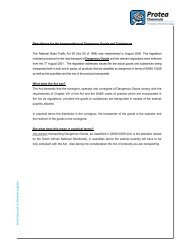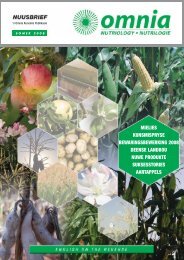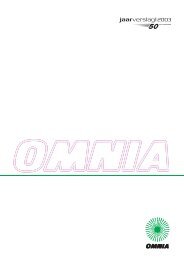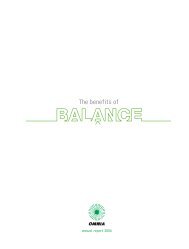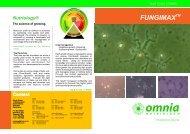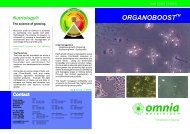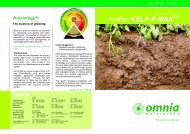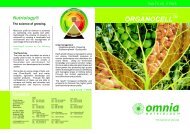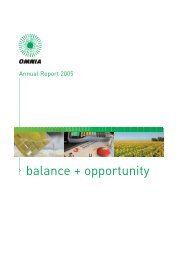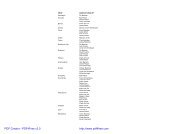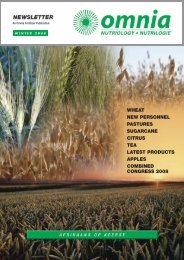omnia holdings annual report 2010 omnia holdings annu
omnia holdings annual report 2010 omnia holdings annu
omnia holdings annual report 2010 omnia holdings annu
Create successful ePaper yourself
Turn your PDF publications into a flip-book with our unique Google optimized e-Paper software.
Financial performance<br />
As expected, volumes improved notably in the South African<br />
domestic market over those of the comparable prior period<br />
when an abnormal and subdued buying pattern developed<br />
amongst the Group’s farmer customers, as a consequence of<br />
the exceptionally high fertilizer prices that prevailed during the<br />
first half of the prior financial year. However, the subsequent<br />
significant 35% reduction in average fertilizer selling prices<br />
caused revenue in the Division to fall by 17% to R3,7 billion<br />
(2009: R4,5 billion).<br />
The inventory write-down discussed below was the main cause<br />
for the Division to show an operating loss of R85 million for the<br />
period (2009: R410 million profit).<br />
Operational performance<br />
The <strong>2010</strong> financial year was one of the most difficult years yet<br />
experienced by the fertilizer industry.<br />
International traders took up long positions in fertilizer stock as<br />
prices began to increase rapidly in 2008. These prices then fell<br />
rapidly during October 2008, coinciding with the South African<br />
maize planting season during which farmers, because of the low<br />
prices of maize on key markets, reduced the hectares and<br />
application rates. This further dampened demand for fertilizers at<br />
what was a critical time for Omnia. In what was a double blow,<br />
commodity prices then fell a further 24% and the rand<br />
strengthened by 23% during the first half of the <strong>2010</strong> financial<br />
year. All major competitors responded to the market conditions<br />
by trying to liquidate their long stock positions, and margins<br />
came under severe pressure. The inevitable consequence was<br />
that stock had to be written down, resulting in a financial loss of<br />
R350 million. Internationally, however, Omnia achieved fertilizer<br />
sales growth, with increased sales being attributable mainly to<br />
the wide range of specialist fertilizers available from Omnia and<br />
the comprehensive support provided to farmers through the<br />
Nutriology ® offering. This includes the development of products,<br />
services and relationships within the agricultural sector. Central<br />
to its delivery are Omnia’s agronomists who are supported by<br />
world-class analytical laboratories, research and development,<br />
biological analyses and quality control.<br />
The introduction of Omnia products to new distributors also<br />
increased volume sales and provided additional sales opportunities.<br />
Speciality sales of coated granular products increased as farmers<br />
began to appreciate the value of K-humate and trace elements at<br />
the time of planning row crops. Testing of silica and boron<br />
OMNIA ANNUAL REPORT <strong>2010</strong> 33<br />
products have proved successful and will add further appeal to<br />
Omnia’s specialised fertilizer product offerings.<br />
The African business performed well overall and sales increased<br />
to commercial farmers operating in Malawi, Zambia, Zimbabwe,<br />
Angola, Botswana and Madagascar. Competition for market<br />
share intensified as some companies offered prices below<br />
import parity. Nutriology ® , which has differentiated Omnia<br />
from its competitors since the company entered the market,<br />
will continue to be a business focus.<br />
ETC Bio-Energy Zambia, with whom Omnia has been pioneering<br />
the growth of Jatropha seed, a biofuel alternative to diesel,<br />
continued with planting. Some 2 100 hectares have been<br />
planted, making it possible to commence with the manufacture<br />
of biodiesel in a refinery. In Zimbabwe, despite ongoing political<br />
and economic problems, Omnia Zimbabwe performed well.<br />
In the Australasian business, the downward trend in fertilizer<br />
prices abated. However, the weak margins persisted as<br />
businesses disposed of high value stock at low margins.<br />
The pecan nut industry, a key agricultural activity in New<br />
Zealand, failed to meet expectations as international demand for<br />
the crop declined. This had a negative impact on the volumes of<br />
fertilizer sold into the sector. The currencies of both Australia<br />
and New Zealand remained stable during the year under review,<br />
but remained high against the US dollar.<br />
The net result was a slow recovery in margins in Australia as the<br />
region returned to a break-even level.<br />
Outlook<br />
Omnia Fertilizer has huge potential to grow in spite of the<br />
current instability in the market, as farmers continue to seek<br />
quality products and the services offered by Omnia to assist<br />
them with profitable farming.<br />
Enhancing the Nutriology ® market position will continue to be<br />
a focus and customer service levels will be improved in<br />
appropriate areas.<br />
The strong trend towards micro-nutrients in fertilizers is<br />
expected to continue and will have a favourable impact on sales<br />
volumes and margins. These sales will be driven by the growing<br />
appreciation among farmers of the role of speciality products on<br />
the yield quantity and quality of their crops.



